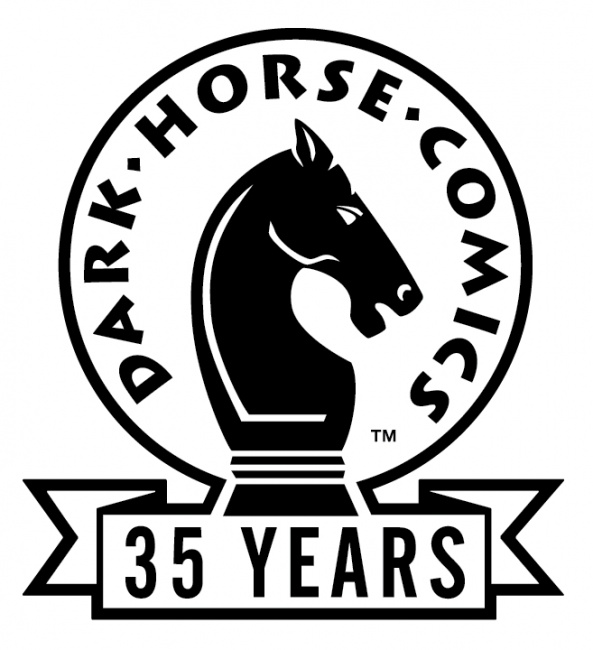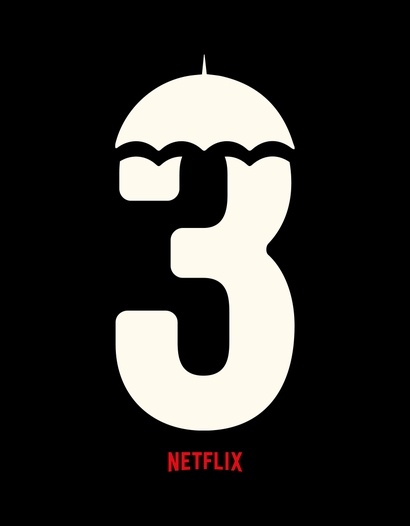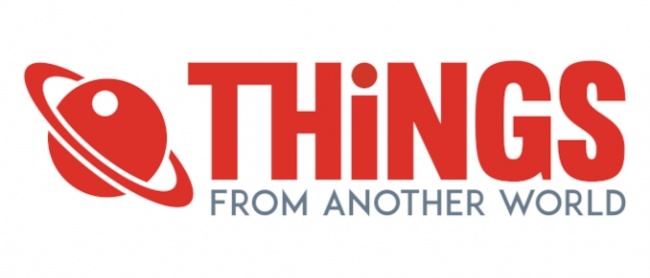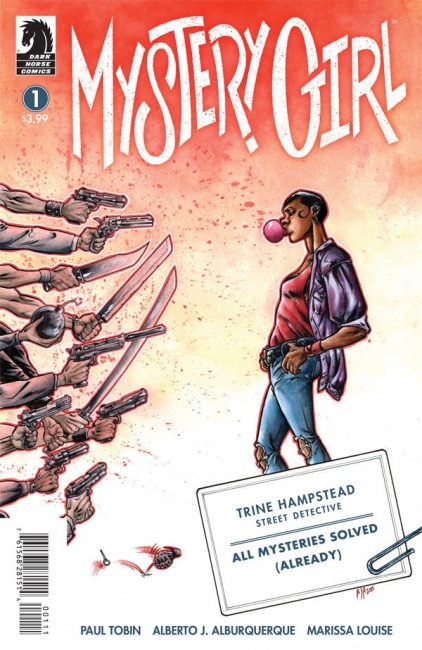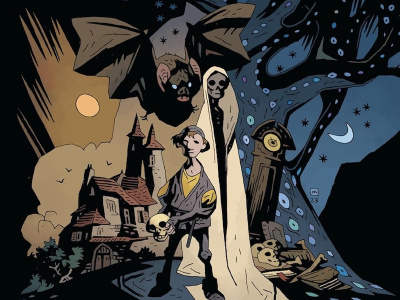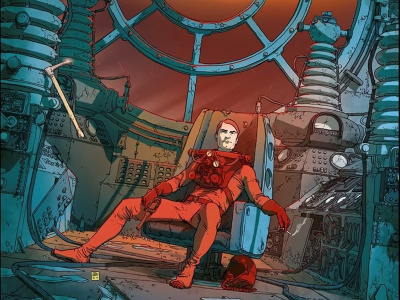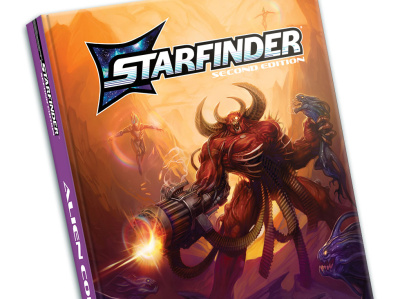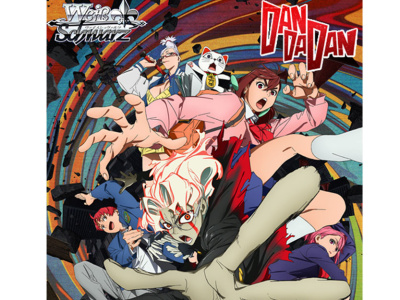Dark Horse Comics turns 35 this year, and we caught up with CEO Mike Richardson in a wide-ranging interview to get his take on the occasion, the state of the market and comic stores, distribution, Dark Horse’s entertainment plans, and more. Interview conducted on August 26. [Edited for length and clarity.]
We're doing this on the occasion of Dark Horse's 35th anniversary. What reflections do you have on hitting this milestone?
A handful of comic companies have done it; I think even fewer can say after 35 years, they had their best year ever. That was our 2020 and our 2021 is tracking ahead of that. It's great, and it's across all areas.
Our entertainment division, Dark Horse Entertainment, is doing terrific. We have a number of projects in production. Of course, we just are wrapping up season three of The Umbrella Academy; we're shooting season two of Resident Alien. We've got some amazing projects that we're about to start shooting, projects that we've worked on for a long time.
The publishing is reaching all‑time highs, especially different… We were never a one‑dimensional publisher, we've always tried to do different types of books, for instance, art books, which are doing very well for us right now.
What was the COVID impact on the art book market?
The only problem we have right now is not the sales, the sales are great. The one problem we're having is getting product here. I flew over LA about three weeks ago, and the cargo ships outside the port down there were lined up out into the ocean. I don't know, there may have been 40 or 50 ships just waiting to be unloaded. My understanding while I was down there, talking to some people that had knowledge, was that they can't even find enough people to come and unload the containers, which is one of the problems.
So we're having some slowdowns, and the cost has gone way up. At the start of the year, I think we were paying about $4,000 a container. I think recently, that's gone up as high as $28,000 a container.
Oh, that's a new record. We've heard over $20,000 a few times. $28,000's a big number. They're all big numbers.
They're all big numbers, especially when you're trying to hold it down, which forces us to look at the pricing. If it's higher‑priced product, that doesn't have much effect, but I worry about comics, because we work on small profit margins on the traditional pamphlets. When you have to add that kind of cost on, you have to make it up somehow.
Are you having product delays because of shipping problems?
Some, yeah, some. We're fighting through it.
Let's back up to big picture on the comics and graphic novel market. What's your assessment of the comics and graphic novel market?
Obviously, it's changing. You saw Random House enter into pamphlet distribution, and that's certainly big news. We've seen another distributor or two jump into it. Steve Geppi's a friend of mine, and I'm rooting for Diamond to figure out how to really succeed as this market evolves.
It's changing, and I think the whole retail market is changing, to some degree, in the direct sales market as the bookstores shrink. We've seen that shrinkage also, but we see more online sales. Of course, Amazon is a juggernaut.
You have some effect of digital, although we know that's flattened out quite a bit. We're seeing small gains every year in the digital distribution.
Actually, digital blew up last year.
Yeah, it absolutely did when everything was closed down.
We're looking at an evolving market. We're seeing dramatic changes in how things are sold in brick and mortar stores. If you look back over history, it's always changed. Products always change, formats always change, and it's only in the moment that you're feeling as though it's a dramatic moment in comics history. If you look back, it's always changed. It's never stayed the same.
What were you seeing in your stores, and what's your overall evaluation of how comic stores in general came through the last 18 months?
Our stores (for instance, the Universal store), we couldn't open. We were shut for a long time. It's come back, though, and I believe we just had a record day there, or a record weekend. Overall, our retail's climbing back up. It's back to doing well. I can't tell you right now whether it's back to pre‑COVID numbers, but I think it's getting close, if it's not.
How do you feel about comic stores in general, how they came through?
I think how they compete is, it's no different than I've always felt. You have to appeal to a larger audience than just traditional comic books. There's such a large percentage of retailers that basically order Marvel and DC and then take a shot at some of the books that are successful.
It seems to me that there's so many books that bring in another audience. I look at our line, our big successes now, a lot of them, it's Witcher and Avatar: The Last Airbender, and Stranger Things, and big licensed tie‑ins that bring in people.
That's been the case from the beginning. You've been around for a long time; you remember when we did Aliens. The number one thing retailers said (and we had a lot more stores back then) when we did the first Aliens series, the thing we heard from everybody, was that it was bringing customers they never saw into the store. I think media properties (and there was a long time I wouldn't say this) now, more than ever, do bring in new customers.
What are your thoughts on what's going on with manga? What's your evaluation of that situation (that's been exciting)?
Yeah, it's taken off. As you know, we've been in manga almost since our first year, and we've seen huge sales. Berserk, we can't keep in print. It just sells as fast as we print it. We put an order together thinking that this will last us six months and it’s sold before we get the book. It's amazing.
The big resurgence, of course, makes us want to expand our line again. It retracted for a while.
Now, it's expanding again. It's cyclical, like the market itself. Part of that, I think, is because, as the market continues to move forward, you get new readers into the market. They're exciting again and new again, because they've disappeared for a while. If you go into the bookstores, and if you go to the manga rack, they continue to expand. I was just in a Barnes & Noble, and there were 12 people sitting around reading manga there. It's an important part of the market. It's an important part to be in, and we felt that, as you know, from our beginning. We think there are a lot of great properties there.
There's the attraction of the Japanese material. During the 90s, with the anime, I think that really paved the way for the explosive growth of manga in the 2000s.
And cable TV. They were showing Dragon Ball episodes four in a row after school. Now, that's been replaced by streaming. This is the first time in about 15 years, or 12 or 13, anyway, that anime has had this kind of exposure. Any kid can get it on their phone, so it's a wonderful thing.
That's what I'm talking about. They get exposed to it, and then there's a period of time as it grows, and then after years of looking at the anime, they start picking up the manga.
You mentioned that you were thinking about taking your release count for manga up. What's been the overall situation with Dark Horse's releases, comparing '19, '20, '21? Did you cut back in '20 and '21?
One of the reasons we cut back is because Diamond had their issues during that, so we couldn't ship a lot. Random House, because they were worried that so many books were coming in, they asked us to cut back, so we did it by request. They found pretty quickly that, at least in the traditional book market, the demand was still there, and actually in some cases, growing. For us, it was great, because our backlists became huge.
My explanation for that is, in the direct sales market, where Marvel and DC generally dominate, a lot of people who looked elsewhere for comic material during that period (and particularly online), saw a lot of Dark Horse stuff that they never knew had been released, because the majority of comic shops don't order a full line of Dark Horse comics, or any other publisher except Marvel and DC. I think that a lot of our books were discovered, and we saw tremendous sales in our backlists.
It was really exciting, and allows us to keep a lot of books in print, as well as bring a lot of books back to try to see if we find an audience for them. Whatever the reason, we've seen a huge surge in people who are buying Dark Horse and are aware of Dark Horse in the comics market.
By the way, that could go along with the success we've had in the entertainment side. The Umbrella Academy is a huge success for Netflix. Resident Alien's a huge success for the Syfy Channel. We've had two big hits, and of course, that doesn't hurt, when people are looking, to see your name.
What are you doing this year, then, in terms of number of releases?
I think generally we're looking to increase. We're looking for, as always, good titles. I think we're more willing in good times to take risks.
You talked a little bit about Diamond, and you said you're rooting for them. What's your prognosis? What's going to happen?
Look, they have more competition than ever now. I think Random House getting into that marketplace is a big competitor for them. It's hard to say how that will play out in the direct sales market, because I think Diamond has a portion of that market that's very loyal to them.
After some of the publisher losses they've experienced, if there's any kind of a movement away from them over to competitors, it puts them in a difficult position. But Steve's got resources. Diamond may have to rethink how they're doing things. I'm hoping that they prosper; it’s good for the market if they prosper.
Is Dark Horse contemplating any changes to its periodical distribution?
Not now, but of course, I'll always look at what's going on. Not today, as I sit here, but we're watching.
One of the comics phenomena we've been watching here for about 10 years (because of a couple of Korea trips in that period) is the webtoon phenomenon, which is just exploding (see, for example, "Digital Comics Mega-Deal" and "Webtoon Running Multi-Million Dollar Ad Campaign"). Is Dark Horse doing any webtoon collections, or are you involved in that business at all?
No, not really. [Substack] is going to do comics (see "James Tynion IV Leaves Batman for Substack"). I saw that somebody said, "This is great, because creators get to own their own work, and they get to control their own work. They can decide what they're doing."
I thought, "Oh, what we've been doing since 1986."
It's just another distribution form, which is good. Look, one of the things that made comics so popular back in the '40s and '50s, and even into the '60s, was that wherever you went, you saw comics. I went to the train station. Best selection of comics ever. I always wanted to get back to that train station. Our drugstores all had comics. Our grocery stores had comics. In Milwaukie, where I grew up, the meat market had a spinner rack of comics. Wherever you went, comics were. Of course, going from the late '70s and then forward, comics became less and less in public view, which isn't going to be a good thing for sales.
Now, comics are showing up more and more places, and not always in traditional formats or distribution channels, but the more they're seen, the better. I want them all to do well. It's all good for us. It's good for people in the comics business to have comics everywhere.
Dark Horse had to make some significant upgrades to its human resources policies and practices last year (see "Dark Horse Announces New Code of Conduct"). What can you tell us about the status of that work?
We've brought in an outside company to handle our human resources. I want to make sure we do things right. Certainly, we've had a learning curve in that area, so we have someone that oversees it.
We have a committee in‑house, an HR committee also, that works with the company in dealing with our HR issues, and it's turned out pretty well. We've changed a lot of things. That helps us for problems that arise, and it's also for employee comfort and making the job, the workplace, a better place.
In the past, you’ve told us you have about 150 people. Is that still about the same, or is it different now?
I think we're marching towards 175, 180, somewhere in there. We're still hiring. It's a big company. It's a lot different than Randy Stradley and myself putting comics up together on the counter and making our own gag ads for our books. [laughs] Randy retired (see "Stradley Retires from Dark Horse"). That's a big blow to me. He decided finally he'd had enough and wanted to take some time off. Randy's been with me since the beginning, so that was a hard thing to take. He had a huge influence on our success, particularly with creators.
You mentioned the entertainment division was doing well. Anything else on that front that you're excited about?
Yeah. We have a lot of things going on right now, and a lot of projects in development. We've got Mystery Girl coming with Tiffany Haddish. We've got Lady Killer with Blake Lively. We've got a bunch of projects moving forward towards production. Not greenlit yet, but on the edge.
What are you excited about in the comics and graphic novel space that’s coming out in the next 6 to 12 months?
I'm real excited about some announcements we've made recently. Scott Snyder, Brian Bendis, those are great announcements for us (see "Dark Horse To Publish Eight New Scott Snyder Titles" and "Bendis Moving Creator-Owned Titles to Dark Horse”). We have some others that we'll be announcing soon that we're bringing out. We have some big announcements with comics by some well‑known personalities, for instance, Whoopi Goldberg, I know I can talk about that, because she's talked about it on The View. We have a comic series with her and other people of that stature in the entertainment industry. Going to be a lot of fun.
We've been doing these anniversary interviews once every five years (see "Richardson on 30 Years of Comic Publishing"). What do you think we'll be looking at five years from now, assuming we're both here?
Five years from now, my goal is to be a comics/media giant bigger than Marvel and DC. That's the goal. That's been the goal since day one.
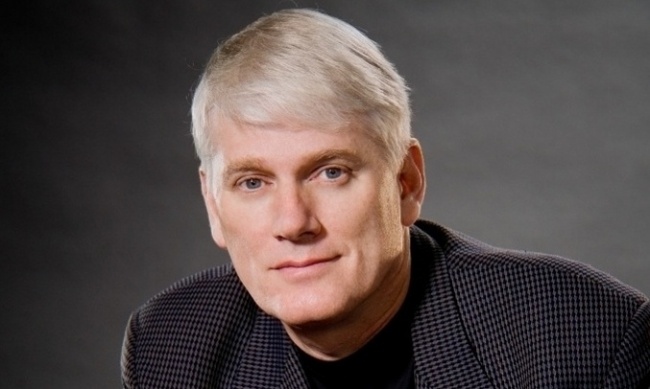
On 35 Years, the State of the Market and Comic Stores, Distribution, Entertainment, and More
Posted by Milton Griepp on September 9, 2021 @ 3:40 am CT
MORE COMICS
ComicHub and BookScan Best-Seller Lists Reveal Diverging Tastes
August 20, 2025
A look at the ComicHub and BookScan best-seller lists shows that comic shop customers are snapping up a wide variety of indy and retro horror.
Italian Original Raised Over $36,000 on Indiegogo
August 20, 2025
The Italian crowdfunding campaign for the first edition raised over $36,000 from 953 backers on Indiegogo.
MORE NEWS
New 2E Rulebook
August 20, 2025
Paizo, Inc. revealed Alien Core 2 , a new rulebook for Starfinder RPG 2E.
New Booster Set
August 20, 2025
Bushiroad unveiled DanDaDan , a booster set for Weiss Schwarz.



